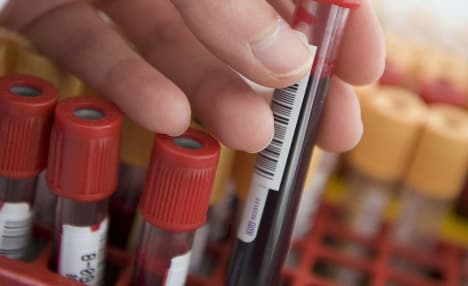German states look to skip court OK on blood tests for drunk drivers

Germany's upper house of parliament agreed Friday to support a draft law making it easier for police to administer blood tests to drivers suspected of being under the influence of drugs or alcohol.
The initiative – which was put forth by the state of Lower Saxony and will be sent on to the Bundestag – would officially grant police and public prosecutors the ability to order blood samples without a judge's approval.
The Bundesrat upper house, which represents the German states, hopes to minimise delays and thus maximise the accuracy of blood alcohol readings to support the prosecution of drunk-driving offences.
The plan was met with opposition from some members of the Free Democrats – with a legal expert for the party arguing that the court order stipulation was a key form of protection against government intrusion.
FDP parliamentarian Christian Ahrendt said the policy should not be "sacrificed for the benefit of state finances."
Ahrendt characterised the blood test as a form of bodily harm and invasion: "That kind of intrusion is, with good reason, only permissible when allowed by a judge," he said, adding that blood alcohol levels could be "very precisely determined without taking a blood sample."
Under current law, police and public prosecutors may only resort to blood testing if the delay resulting from the wait for a judge's approval would lead to inaccurate readings. Circumventing the courts is already common practice in some districts where judges are not on-call – which has frustrated police's efforts to gain approval in a timely manner.
Speaking to the Bundesrat, Jörg-Uwe Hahn, justice minister for the state of Hesse, acknowledged that the German constitutional court had objected to the practice but said the draft law would provide a "secure and legal basis for the quick decisions necessary regarding drunk drivers."
The Hessian justice minister noted that drivers tested under the new policy could have their cases reviewed by a court later on.
DPA/DAPD/arp
Comments
See Also
The initiative – which was put forth by the state of Lower Saxony and will be sent on to the Bundestag – would officially grant police and public prosecutors the ability to order blood samples without a judge's approval.
The Bundesrat upper house, which represents the German states, hopes to minimise delays and thus maximise the accuracy of blood alcohol readings to support the prosecution of drunk-driving offences.
The plan was met with opposition from some members of the Free Democrats – with a legal expert for the party arguing that the court order stipulation was a key form of protection against government intrusion.
FDP parliamentarian Christian Ahrendt said the policy should not be "sacrificed for the benefit of state finances."
Ahrendt characterised the blood test as a form of bodily harm and invasion: "That kind of intrusion is, with good reason, only permissible when allowed by a judge," he said, adding that blood alcohol levels could be "very precisely determined without taking a blood sample."
Under current law, police and public prosecutors may only resort to blood testing if the delay resulting from the wait for a judge's approval would lead to inaccurate readings. Circumventing the courts is already common practice in some districts where judges are not on-call – which has frustrated police's efforts to gain approval in a timely manner.
Speaking to the Bundesrat, Jörg-Uwe Hahn, justice minister for the state of Hesse, acknowledged that the German constitutional court had objected to the practice but said the draft law would provide a "secure and legal basis for the quick decisions necessary regarding drunk drivers."
The Hessian justice minister noted that drivers tested under the new policy could have their cases reviewed by a court later on.
DPA/DAPD/arp
Join the conversation in our comments section below. Share your own views and experience and if you have a question or suggestion for our journalists then email us at [email protected].
Please keep comments civil, constructive and on topic – and make sure to read our terms of use before getting involved.
Please log in here to leave a comment.